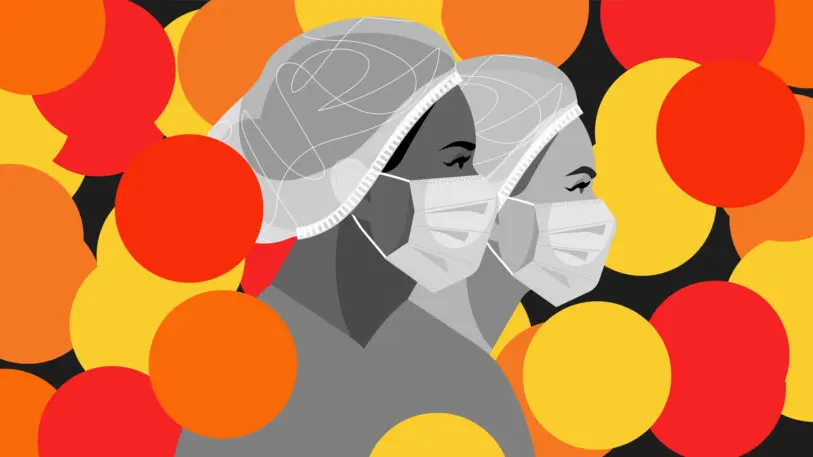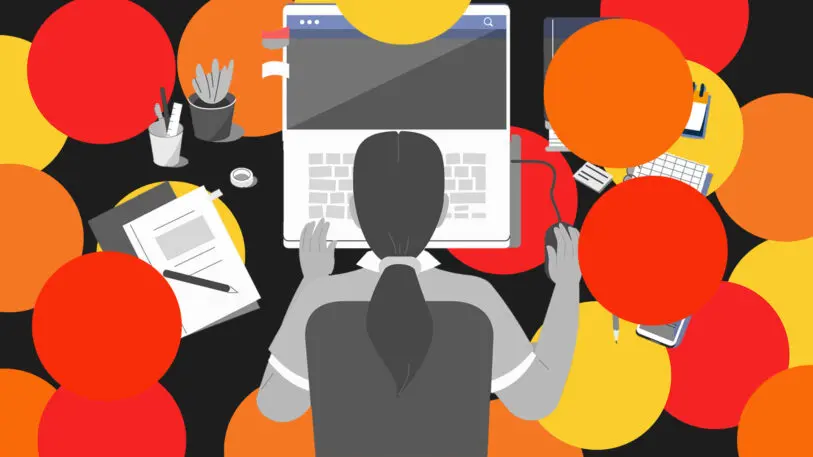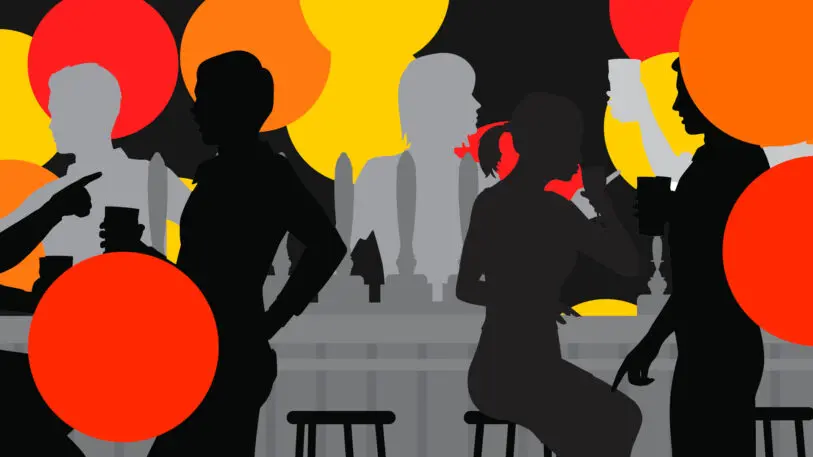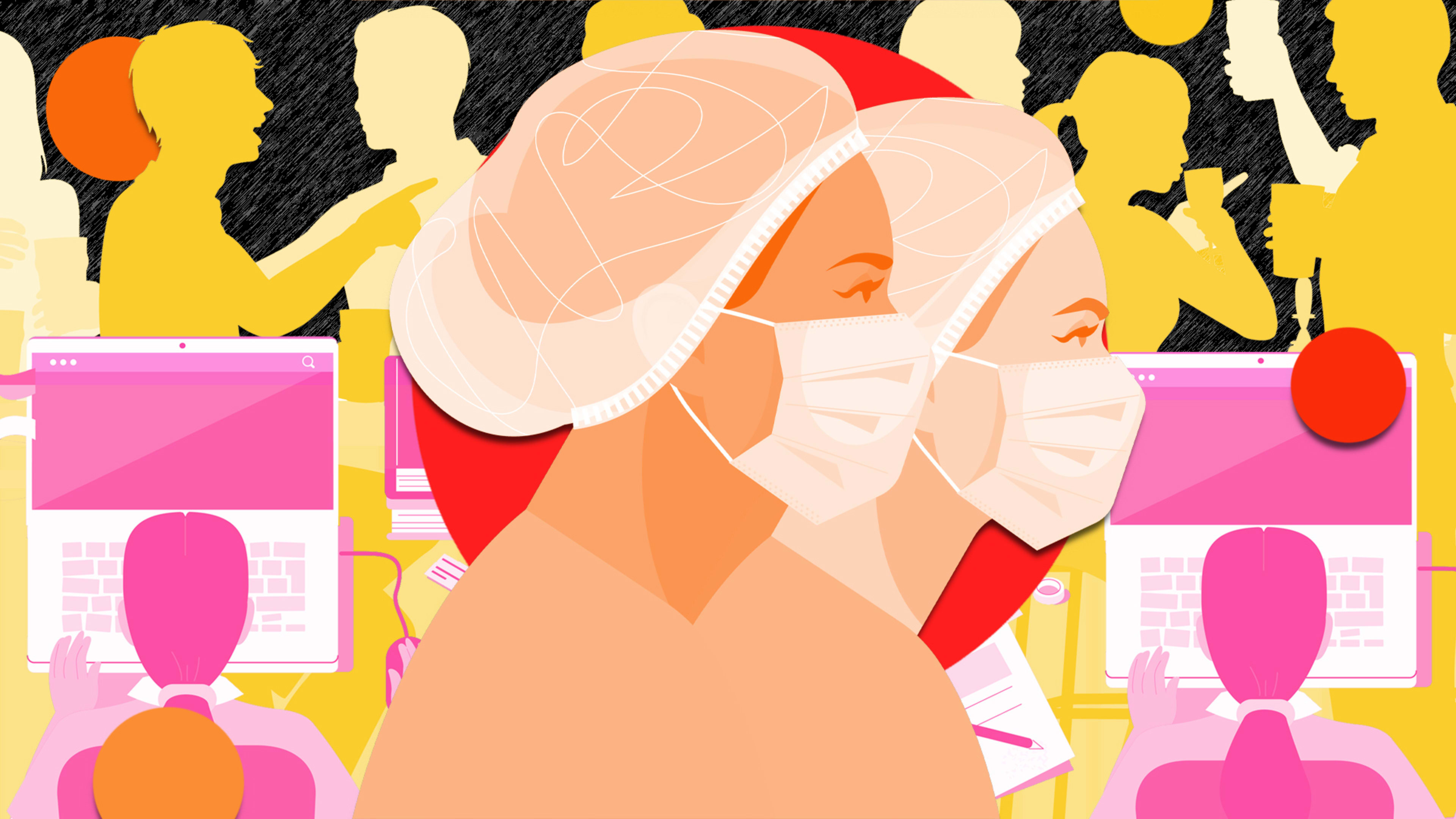When the pandemic began a year ago, many Americans moved their work from the office to the home. They got Zoom fatigue; they tried to find a comfortable space to work; they missed (some of) their coworkers.
But while much has been said about the remote work boom, with as many as 42% of the workforce moving from in-person to online, remote work isn’t an option for a large portion of the workforce.
Many frontline workers are just now starting to see signs of pre-pandemic normalcy, but in many ways their jobs, and lives, will never be the same. To mark the anniversary of the pandemic, we spoke with a healthcare worker, teacher, and bartender about what the past year has been like, and what they hope for the future. These interviews have been edited for clarity and space.

Annelie Roding, 29, Physician Assistant at Eden Health, New York City
I remember last year a patient came in to see us in early January with what he thought was the flu. He was huffing and puffing so much that he could barely walk down the hallway, and I remember thinking it was the worst case of the flu I’ve ever seen. He was young and otherwise healthy, and I couldn’t figure out what was going on. As soon as he left, I told my colleagues that we better sanitize the room.
Then in early March we kept seeing incoming messages and requests from patients who had lost their sense of smell and taste. This was before there was any evidence it could be a symptom of coronavirus, and most had no other major symptoms. It was just so strange that so many people were experiencing this specific symptom at the same time.
Annelie RodingFor most providers the pandemic took a significant toll, but in some ways I felt like everything I had worked so hard to learn was being put to good use.”
For most providers the pandemic took a significant toll, but in some ways I felt like everything I had worked so hard to learn was being put to good use. I felt like this was really my time to shine, and in a way it was exhilarating to serve as a healthcare worker during a pandemic. I had never worked as much as I have this past year, but I felt blessed that I was able to be there for people.
The biggest challenge for me was that I couldn’t provide good, evidence-based information and recommendations, and was even spreading false information at times. Like in the beginning, I told dozens of patients they didn’t need to wear a mask unless they’re sick. That’s something all healthcare workers struggled with.
The lowest point for me was when I saw a freezer truck parked outside of a hospital. I remember thinking, “I can’t believe these people died alone, and are now being wheeled intro a freezer truck on the side of the road like garbage bags.” It was so terrible; I couldn’t really wrap my head around it.
At the same time everyday at 7 p.m. I would hear the clapping for healthcare and frontline workers, and it brought tears to my eyes to see the city, which was the epicenter of the pandemic at the time, coming together like that.
When I got my first dose of the vaccine in January it really felt like there was a light at the end of the tunnel, and seeing others getting it now feels like we’re finally moving out of this terrible time in American history.
Before the pandemic my colleagues and I would joke about people who came in for ridiculous things, like are you seriously coming to a doctor’s office because your new shoes gave you blisters? Then suddenly those complaints stopped, and we hardly saw anyone for things that weren’t COVID-related. Now I can’t wait to go back to helping people with their blisters.

Christina Torres, 33, Middle-School English Teacher at Punahou School, Honolulu
I know that I’m blessed to work at a private school with a really strong culture, and one that gives me a lot of curricular freedom. Before the pandemic I spent a lot of time with the kids, not only because I was their classroom teacher, but also their cross country and track coach.
The pandemic took a little longer to reach Hawaii, so it didn’t really sink in until we were asked to meet with our department just before spring break to figure out what school would look like if we didn’t come back. It was baffling to think about teaching remotely; it was such a restructure of how I’ve managed my classroom in the past.
Christina TorresTeaching during the pandemic felt like being a first-year teacher again.”
Teaching during the pandemic felt like being a first-year teacher again. I was teaching texts I’ve taught for nearly a decade, and suddenly I had to adapt all my lesson plans. I had to really think about what I wanted the kids to take away from it, and just focus on that. It was tiring, not just physically, but mentally and spiritually.
In the spring, it was just about getting kids through the rest of the year, but it was especially difficult to start a new semester in August without seeing the students in person. I was also going through a lot personally at the time. This past year I lost my grandmother, and I’m currently six months pregnant.
When you’re in a service profession, so much of your day goes to making sure everyone else is okay that it’s easy to forget about taking care of yourself. Running or working out on my stationary bike was the only time I had to myself, and I would often cry on my bike, or run a mile and a half and then stop and cry on the sidewalk, just to get it all out.
The thing I missed most was just being able to have fun with my students, or sit back and watch them have fun with each other. You can’t really do that through a screen. In the past few weeks we’ve been able to return to the classroom, and it’s been so great to see the kids having silly conversations, or throwing a ball around, or playing cards. That’s what people usually remember most about school. I hope they remember what I teach them, but the relationships are what’s really important.
What I hope we as teachers take away from this experience is just being more thoughtful of how we ask our students to use their time, and their mental and emotional capacity. The pandemic took so much away from kids in terms of being able to just be kids. I hope we strive to give them more of that time back in the future.

Mark Schettler, 35, Bartender and General Manager at Bar Tonique, New Orleans
Before the pandemic, my job was like clockwork. I didn’t need to use the opening checklist; I could open the bar in my sleep. Mardi Gras is the busiest time of the year in the French Quarter, and in 2020 people actually showed up wearing costumes lampooning coronavirus.
Every year we would joke about the Marti Gras flu; we work such ridiculous hours in close quarters with thousands of people from all over the world, and getting sick is just part of the job. I always get my flu shot and usually stay healthy, but this year I was sick as a dog for a few weeks. In hindsight, I’m pretty sure it was COVID-19. Not coming to work wasn’t a choice though, because the rest of my staff were dropping like flies, and as the manager it was my job to keep the bar running. I didn’t have energy for anything else; as soon as my shift was over I went straight home and got into bed.
After Mardi Gras I took a week off, and by the time I came back in March things were already changing. We started offering hand sanitizer to people as they came in, and started looking into contactless payment options. Every day we would work hard to keep up with the changes, and every day there was a new development that moved the goalpost further out of reach. The outlook just kept deteriorating.
The day we shut down, we were all scared of what would happen next. We were worried there would be looting and rioting, because there was no safety net being offered. We emptied out the bar, cleaned out everything, and that was it.
Over the next few months I got involved in a lot of projects to avoid going stir-crazy. I was asked to be part of three of the city’s COVID-19 response and recovery committees and started a legislative research project to lobby for help for the service industry. I also expanded my nonprofit, Shift Change, which received 501(c)3 status three years ago to help combat sexual harassment and assault in the service industry, to include advocating for the needs of the industry more broadly. The first three months of the pandemic were the hardest I’ve worked in my entire life, but I wasn’t getting paid for any of it.
We weren’t able to reopen again until the summer, and only for about four weeks. With capacity limits and the need for more staff, we weren’t making any money, but it was good to be back. We had a few locals and regulars come in for a small taste of normalcy, but we also had a lot of tourists, many of whom felt like they were making a political statement by being there. People got violent; they would throw stuff and curse at us and refuse to abide by the law.
We were trying to maintain a high standard of safety—after all, I helped write the guidelines—and they would come in and be confused why the bar down the street is breaking the rules, and were incredulous that we weren’t too. As great as it was to be back at work it was really awful to feel like my government left me in a position where my only options were risk my life or risk homelessness.
Mark SchettlerWe in the service industry already feel like we’re on the margins.”
We in the service industry already feel like we’re on the margins. People come from all over the world to treat the French Quarter like a toilet, and you need to have a pretty thick skin to work here, but it’s been on a whole other level lately.
The more I thought about it the more I realized there was a direct connection between our situation today and the sexual harassment and assault that’s been so pervasive in the industry. It really comes down to the dehumanization of people who work in service. That manifested this year in the lack of adequate PPE, the way we were told to go back to work with few safety protocols in place, the lack of financial safety nets and the Sophie’s Choice of going broke or getting sick.
At the same time I don’t think we’ve ever had a better opportunity to shift that narrative. I hope folks come out of this with a deeper appreciation for what we do, and with a greater appetite for improving working conditions in the industry. We’re trying to make our voices heard, but at some point it’s going to take a change in public sentiment to make that shift a reality. After all we’ve been through this year, I hope people are ready to listen.
Recognize your brand’s excellence by applying to this year’s Brands That Matter Awards before the early-rate deadline, May 3.
